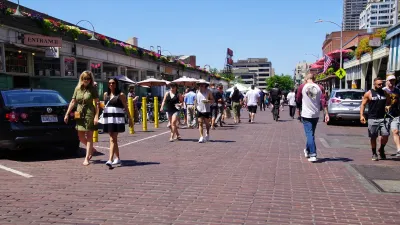Acknowledging that rising sea levels are a major concern for waterfront cities in Washington, the Municipal Research and Services Center (MRSC) non-profit put together a review of the current policy and planning efforts to meet the challenge.
"In Washington State, sea level projections estimate a middle range rise of about 2.6 inches by 2030, about 6.5 inches by 2050, and about 24 inches by 2100," reports Carol Tobin. In response to the expected impacts of the rising water level along the state's Pacific Ocean coastline and around Puget Sound, many communities have already begun planning for the inevitable.
A few examples of the Washington communities that have begun to factor sea level change into their comprehensive planning and public works programming, as shared by Tobin:
- "Olympia has studied the impacts of sea level rise on the downtown and infrastructure and has been working to address inundation of Budd Inlet and Capitol Lake shorelines and pipe backflow flooding. Sea level rise is addressed in the city’s recently adopted shoreline master program and in the current comprehensive plan update."
- "Seattle has mapped areas that are most vulnerable to sea level rise. King County has assessed the vulnerability of major wastewater facilities to flooding from sea level rise and has included adaptation policies in its Strategic Climate Action Plan (2012)."
- "The Gorst Watershed Subarea Plan, prepared by Bremerton and Kitsap County, recommends adaptation measures to account for sea level rise in the design of buildings and impervious areas, as well as roadway, flood management, and utility facilities."
Before concluding with a call to action, the article also lists planning tools, regulatory approaches, spending ideas, and leadership opportunities for how communities can begin preparing for sea level rise.
FULL STORY: Sea Level Rise: A Challenge for Washington’s Coastal Communities

Alabama: Trump Terminates Settlements for Black Communities Harmed By Raw Sewage
Trump deemed the landmark civil rights agreement “illegal DEI and environmental justice policy.”

Study: Maui’s Plan to Convert Vacation Rentals to Long-Term Housing Could Cause Nearly $1 Billion Economic Loss
The plan would reduce visitor accommodation by 25% resulting in 1,900 jobs lost.

Planetizen Federal Action Tracker
A weekly monitor of how Trump’s orders and actions are impacting planners and planning in America.

Waymo Gets Permission to Map SF’s Market Street
If allowed to operate on the traffic-restricted street, Waymo’s autonomous taxis would have a leg up over ride-hailing competitors — and counter the city’s efforts to grow bike and pedestrian on the thoroughfare.

Parklet Symposium Highlights the Success of Shared Spaces
Parklets got a boost during the Covid-19 pandemic, when the concept was translated to outdoor dining programs that offered restaurants a lifeline during the shutdown.

Federal Homelessness Agency Places Entire Staff on Leave
The U.S. Interagency Council on Homelessness is the only federal agency dedicated to preventing and ending homelessness.
Urban Design for Planners 1: Software Tools
This six-course series explores essential urban design concepts using open source software and equips planners with the tools they need to participate fully in the urban design process.
Planning for Universal Design
Learn the tools for implementing Universal Design in planning regulations.
Caltrans
Smith Gee Studio
Institute for Housing and Urban Development Studies (IHS)
City of Grandview
Harvard GSD Executive Education
Toledo-Lucas County Plan Commissions
Salt Lake City
NYU Wagner Graduate School of Public Service





























